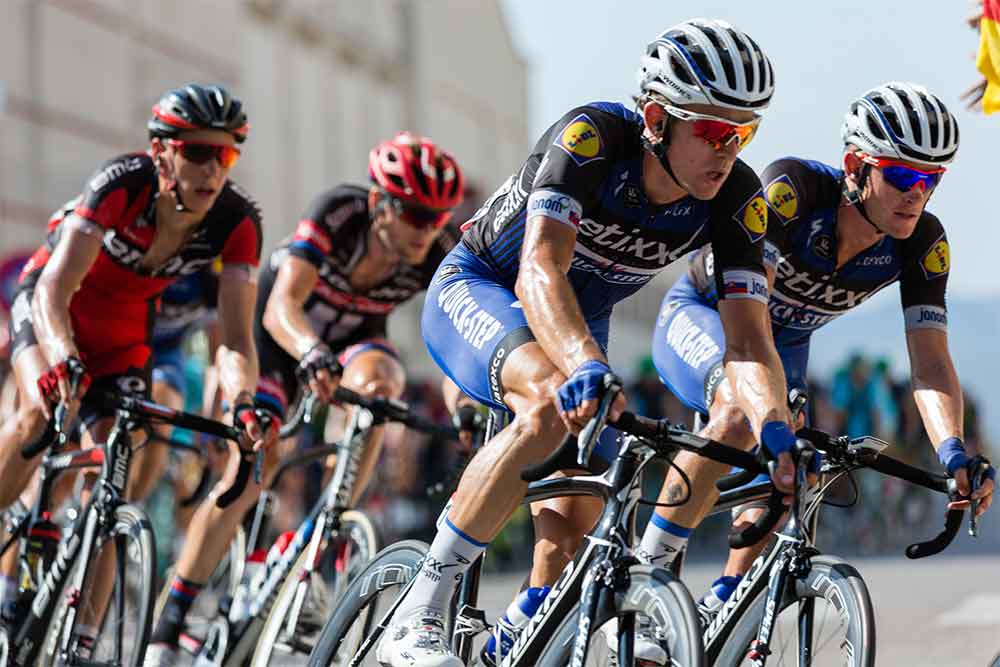Could a Carb Mouth Rinse Be the Next Best Performance Booster?

Evan Stevens
The last thing an athlete wants is to feel like they have no energy. Staying fueled and being able to maximize your energy output means better performance. Fueling means quick energy to the system through – sugars in the forms of drinks, tablets, and gooey, gel substances are often the go-to for athletes. Yet a quick look at a fueling section in your local sports store can be mind-boggling, especially when all you are looking for is a quick energy booster.
Why are there so many? Surely there must be a “best” thing that will provide energy, right? The problem is that everyone digests sugars differently. Some people digest glucose very well while others can’t handle it, it upsets their stomachs and has to use something different, like fructose. Others maybe need a mix of the two or some combination of mono-, di-, and polysaccharides. Sugars can cause gastric intestinal distress; there are so many different products and none can claim to be “the best” because they may work for one person but in another can cause debilitating cramps and frequent stops to relieve oneself. Optimizing performance and output without GI distress is not only a huge industry, but a constant concern for athletes, so what are we to do?
Related Article: A Taste of Sugary Drinks May Improve Athletic Performance
The Carbohydrate (CHO) Mouthwash
One of the latest trends in the area of performance output without the GI distress is the use of a carbohydrate (CHO) mouthwash. We know that CHO ingestion improves performance because it not only provides energy, it activates the CHO metabolic pathways; it increases insulin in the blood which moves glucose transporters to the cell membranes which increases uptake into cells (for storage and/or use by muscles) and dumps glucose into the blood (from storage) for use. However, insulin fluctuations have their own issues especially with certain populations, and we know that sugar dumps into a working system (lack of blood flow to the stomach) can lead to GI distress, high CHO intake can present a problem. The hypothesis is that a CHO mouth rinse may provide performance benefits without stressing the system.
How Does it Relate to HIIT Performance?
 An article published in the Journal of Applied Physiology, Nutrition and Medicine looked at the effects of a CHO mouth rinse and how it relates to HIIT (high-intensity interval training) performance. HIIT offers a unique insight into energy utilization because of the high-cost demands over short periods of time as well as the large alteration to blood flow away from non-working muscle systems (the stomach and digestive system which is why GI distress occurs).
An article published in the Journal of Applied Physiology, Nutrition and Medicine looked at the effects of a CHO mouth rinse and how it relates to HIIT (high-intensity interval training) performance. HIIT offers a unique insight into energy utilization because of the high-cost demands over short periods of time as well as the large alteration to blood flow away from non-working muscle systems (the stomach and digestive system which is why GI distress occurs).
The Runners Study
The researchers tested eight recreationally trained runners in three separate time trials: CHO mouth rinse (CMR) + placebo capsule, Caffeine (in the form of a capsule) with CMR (CMR+CAF), and a taste-matched placebo (PLA) and placebo capsule. The subjects performed both a 45-minute steady state (SS) run and a HIIT protocol (90% peak treadmill velocity) until fatigue. The subjects received a 25ml bolus mouth rinse of any of the three solutions prior to the tests and heart rate and lactate responses were recorded throughout the SS and HIIT protocols.
The Findings
The researchers found that the CMR + CAF significantly improved distance covered before time to fatigue but there was little difference between the CMR alone and PLA. What this means is that caffeine was the largest contributor to performance both in longer, steady-state exercises and in the higher intensity exercises in terms of distances covered and time to fatigue. This is nothing new as caffeine is a well documented ergogenic aid. However, caffeine can cause GI distress of its own and the fact that the mouth rinse did not cause any distress may have had some benefit to caffeine utilization by prolonging the digestion.
Related Article: Coffee: Fitness Friend or Foe?
The Cyclists Study
Another article published in the Journal of Sports Science and Medicine this past month performed a similar test on trained cyclists and a time trial performance with the aim of looking at some of the underlying mechanisms. The researchers in this study aimed to determine the exact impact on plasma insulin and glucose concentrations following CMR.
Eight highly trained male cyclists (aged 24 ± 2, VO2max 65.5 ± 2.2ml/kg/min) completed three simulated 40km time trials (one familiarization trial, one CMR, and one PLA). Plasma insulin was collected every 5km through the first 25km and plasma glucose was collected every km throughout the entirety of the bout.
The Findings
The researchers found that plasma insulin remained unchanged throughout the first 25km and similarly the plasma glucose remained relatively unchanged throughout the entirety of the bout and with little to no difference between the CMR and PLA trials. However, time to complete the 40km trial was significantly faster in the CMR than the PLA trial (67.1 ± 1.1 minutes compared to 67.9 ± 1.0) for average performance benefits of 1.1%, which is a lot in the world of elite cycling. The researchers also measured the mean and peak VO2 output of the athletes and found that there was little to no difference between the CMR and PLA groups. This means that performance improvements are independent of plasma insulin and glucose concentrations, which leaves us in an odd place where CMR works, but we just don’t know why.
Takeaway
We at one time thought that CMR might spur the insulin pathway and be able to better tap into stored sugars/glycogen and increase the uptake into working muscles. But the latest studies are showing that performance benefits aren’t tied to the insulin pathway and that we see better performance improvements at longer time trials as opposed to shorter, higher intensity trials instead (which seems at odds with our energy demands the longer we go, yet bodes well for those of us who get GI distress at longer distances where maybe we are taking in more fuel throughout the exercise bout).
Caffeine remains to be one of the only reliable ergogenic aids for shorter, higher intensity bouts (HIIT-type exercises) whereas CMR may be better for prolonged (approximately 1 hour) time trial performances. Right now we don’t know why that may be though, future studies are going to have to find out why this is the case. If we know why we can optimize better. But for now, keep taking the caffeine before shorter workouts and try a CHO mouth rinse during longer exercise bouts.
Related Article: 6 Tips to Fuel Your HIIT Nutrition Plan
You Might Like:
5 High-Intensity Interval Training Mistakes Athletes Make
Alyssa Bialowas High-intensity interval training (HIIT) is one of the hottest fitness trends right now, and because of this, many people have put their own spin on it to try and make it their own....Do Ketogenic Diets Reduce Anaerobic Performance?
Evan Stevens Ketogenic diets have come to the forefront of popular health fads in the past few years. Placing the majority of our health and dietary problems on carbohydrates (due to the spike in blood...Does the Keto Diet Affect High-Intensity Exercise Performance?
A Review by Alyssa Bialowas The ketogenic diet has been making waves due to its effective weight loss and health benefits, such as reducing blood sugar levels, increasing good HDL cholesterol and improving heart health....The Best Way to Prevent Gut Rot During Your Workout
Alyssa Bialowas One of the worst things that can happen to you before you start an intense workout, or worse as you’re 30 seconds into a run or a race: gut rot. Feeling pain and...Could a Carb Mouth Rinse Be the Next Best Performance Booster?
Evan Stevens The last thing an athlete wants is to feel like they have no energy. Staying fueled and being able to maximize your energy output means better performance. Fueling means quick energy to the...6 Tips to Fuel Your HIIT Nutrition Plan
Alyssa Biawolas If you’re spending a lot of time creating and abiding by your workout plan, a healthy meal plan will enable you to get the most out of your efforts. When creating a nutrition...Devenney, S., Mangan, S., Shortall, M. and Collins, K. (2018). Effects of carbohydrate mouth rinse and caffeine on high-intensity interval running in a fed state. Applied Physiology, Nutrition, and Metabolism, 43(5), pp.517-521.
Kevin O. Murray, Hunter L. Paris, Alyce D. Fly, Robert F. Chapman, Timothy D. Mickleborough. (2018) Carbohydrate Mouth Rinse Improves Cycling Time-Trial Performance without Altering Plasma Insulin Concentration. Journal of Sports Science and Medicine (17), 145 – 152.















